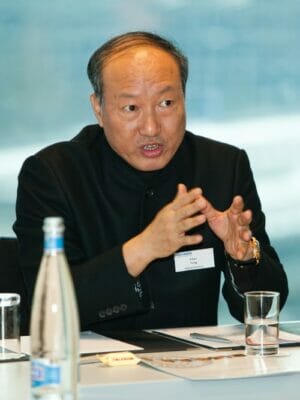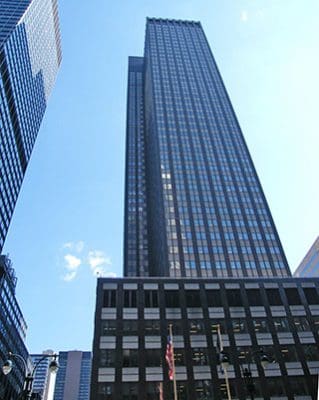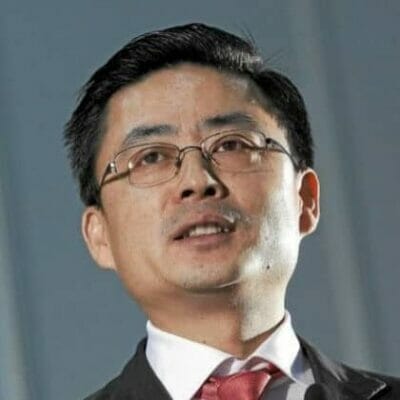
Chairman Chen Feng is HNA’s most visible public face
HNA Group, the mainland conglomerate that has racked up more than $30 billion in outbound deals since last year, has moved to address concerns about its ownership structure by revealing that it’s now controlled by a pair of obscure charity foundations.
The closely held investment group now says that more than half of its shares are held by a pair of charitable organisations, after its largest shareholder, a 30-something Beijinger, recently gave all his shares to a good cause.
The Hainan-based company has come under fire from the Chinese government and is facing increased scrutiny by overseas banks and regulators, as questions continue to arise concerning the sustainability of China’s outbound investment surge, and the financial integrity of some of the country’s most high-profile outbound investors.
Mysterious Businessman Gives It All Away
HNA on Monday released a statement showing that its largest shareholder, a mysterious figure named Guan Jun, has recently transferred his 29.5 percent stake in the company to a non-profit organization HNA set up in New York, according to a report in The New York Times. Together with another 22.8 percent stake held by a sister charity in southern China, the twin organizations – Hainan Cihang Charity Foundation and Hainan Province Cihang Charity Foundation – have a controlling stake of over 52 percent in the sprawling firm.
The statement, addressed to the company’s employees, partners and customers, did not identify Guan, saying only that he was a private investor in China. Previous efforts to track down the elusive Beijing businessman have ended in frustration. Chairmen Chen Feng and Wang Jian are the next-largest shareholders, each holding around 15 percent of the group.
HNA’s restructuring is the latest twist in a cross-border investment drama that has ensnared Anbang Insurance Group, Dalian Wanda Group and other Chinese corporate champions. After nearly five years of crescendoing acquisitions of companies across North America, Europe and other parts of the world, these mainland contenders have seen their overseas ambitions blocked by a dual-layer wall of Chinese capital controls and foreign government scrutiny.
HNA Tries to Clarify Matters

HNA closed on its $2.2 billion acquisition of Manhattan’s 245 Park Avenue in May
The revelation by HNA, which is the parent of Hainan Airlines, comes as regulators in some of the countries it has targetted during its unparalleled acquisition spree begin to pressure the company for information on its shareholding and financial structure.
European regulators are considering a probe into the company’s 9.9 percent stake in Germany’s Deutsche Bank, while US authorities are reviewing its proposed purchase of Skybridge Capital, the New York-based investment firm founded by newly appointed White House communications director Anthony Scaramucci.
Questions about the company’s opaque structure also reportedly played a role in Bank of America recently telling its investment bankers to halt any business with HNA.
Chinese Crackdown Raises Concerns
The ambitious firm was among the four companies singled out by Chinese regulators last month for enhanced scrutiny. Besides HNA, banking regulators reportedly told China’s major state-owned lenders in mid-June to review lending to Dalian Wanda Group and Fosun International, citing concerns over financial risk stemming from the companies’ big-ticket overseas acquisitions.
Wanda, the China’s largest commercial property firm, was targetted for special punishment, with Chinese president Xi Jinping reportedly signing off on a clampdown on lending to the company’s overseas projects on June 20. Over the weekend, Wanda boss Wang Jianlin seemed to confirm the restrictions, saying the group would focus its investments within China going forward.
The harsh crackdown on Wanda provokes a new round of scrutiny of HNA’s financial stability, after it has already borrowed some $90 billion from state-owned banks to fuel its global expansion and acquisition binge. The company, which now has an annual revenue of $100 billion, more than quadrupled its assets to RMB 1.2 trillion ($177.5 billion) from 2014 to 2016, and employs 400,000 people worldwide.
HNA Sees Government Support for Overseas Deals

Adam Tan, chief executive of HNA Group, says there’s nothing to worry about
HNA’s investments in the US alone are said to total $35 billion, including its $6 billion purchase of Ingram Micro, and a $2.2 billion deal for 245 Park Avenue in Manhattan. The group also acquired a stake in Hilton Hotel group for $6.5 billion, and is estimated to have paid nearly $2 billion for Minnesota-based Carlson Hotels – among other high-profile deals.
In addition to its North American portfolio, the group also has a major presence in Hong Kong, after snapping up a series of residential land parcels in Kai Tak for a record-breaking total price of HK$27 billion ($3.5 billion).
In a noteworthy interview with London’s Financial Times, HNA’s chief executive officer Adam Tan dismissed concerns regarding the group’s opaque ownership and pushed back against regulatory scrutiny. Tan also rejected the idea – which had already been put forward by other officials within the group – that HNA has put its deal-making spree on hold.
“We may do things more cautiously. But anything related to One Belt, One Road and the Chinese government is in full support of that. So a lot of things can happen,” he said.
Leave a Reply